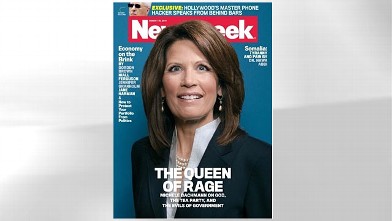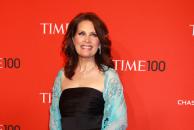Since 2008, Newsweek has undergone a series of internal and external contractions designed to shift the magazine's focus and audience while shoring up the title's finances. Instead, losses at the newsweekly accelerated: revenue dropped 38 percent from 2007 to 2009. The revenue freefall prompted an August 2010 sale by owner The Washington Post Company to 92-year-old audio pioneer Sidney Harman—reportedly for a purchase price of $1.00 and an assumption of the magazine's liabilities. Editor Jon Meacham departed from the magazine upon completion of the sale.
In 2003, worldwide circulation was more than 4 million, including 2.7 million in the U.S; by 2010 it was down to 1.5 million (with newsstand sales declining to just over 40 thousand copies per week). Newsweek publishes editions in Japanese, Korean, Polish, Spanish, Rioplatense Spanish, Arabic, and Turkish, as well as an English language Newsweek International. Russian Newsweek, published since 2004, was shuttered in October 2010. The Bulletin (an Australian weekly until 2008) incorporated an international news section from Newsweek.
Based in New York City, the magazine has 22 bureaus: nine in the U.S.: New York City, Los Angeles, Chicago/Detroit, Dallas, Miami, Washington, D.C., Boston and San Francisco, as well as overseas in London, Paris, Berlin, Moscow, Jerusalem, Baghdad, Tokyo, Hong Kong, Beijing, South Asia, Cape Town, Mexico City and Buenos Aires.[citation needed]
Newsweek was launched in 1933 by a group of U.S. stockholders "which included Ward Cheney, of the Cheney silk family, John Hay Whitney, and Paul Mellon, son of Andrew W. Mellon". Paul Mellon's ownership in Newsweek apparently represented "the first attempt of the Mellon family to function journalistically on a national scale."
To launch Newsweek, the group of original owners invested around $2.5 million. Other large stockholders prior to 1946 were a public utilities investment banker named Stanley Childs and a Wall Street corporate lawyer and director of various corporations named Wilton Lloyd-Smith.
Originally News-Week, the magazine was founded by Thomas J.C. Martyn on February 17, 1933. That issue featured seven photographs from the week's news on the cover.
In 1937 Newsweek merged with the weekly journal Today, which had been founded in 1932 by future New York Governor and diplomat W. Averell Harriman, and Vincent Astor of the prominent Astor family. As a result of the deal, Harriman and Astor provided Newsweek with $600,000 in venture capital funds and Vincent Astor became both Newsweek's chairman of the board and its principal stockholder between 1937 and his death in 1959.[citation needed] In 1937, Malcolm Muir took over as president and editor-in-chief. Muir changed the name to Newsweek, emphasized interpretive stories, introduced signed columns, and launched international editions. Over time it developed a broad spectrum of material, from breaking stories and analysis to reviews and commentary.[citation needed] Richard M. Smith became Chairman in 1998, the year that the magazine inaugurated their "Best High Schools in America" list, a ranking of public secondary schools based on the Challenge Index, which measures the ratio of Advanced Placement or International Baccalaureate exams taken by students to the number of graduating students that year, regardless of the scores earned by students or the difficulty in graduating. Schools with average SAT scores above 1300 or average ACT scores above 27 are excluded from the list; these are categorized instead as "Public Elite" High Schools. In 2008, there were 17 Public Elites. He left the post in December 2007.
In 2003, worldwide circulation was more than 4 million, including 2.7 million in the U.S; by 2010 it was down to 1.5 million (with newsstand sales declining to just over 40 thousand copies per week). Newsweek publishes editions in Japanese, Korean, Polish, Spanish, Rioplatense Spanish, Arabic, and Turkish, as well as an English language Newsweek International. Russian Newsweek, published since 2004, was shuttered in October 2010. The Bulletin (an Australian weekly until 2008) incorporated an international news section from Newsweek.
Based in New York City, the magazine has 22 bureaus: nine in the U.S.: New York City, Los Angeles, Chicago/Detroit, Dallas, Miami, Washington, D.C., Boston and San Francisco, as well as overseas in London, Paris, Berlin, Moscow, Jerusalem, Baghdad, Tokyo, Hong Kong, Beijing, South Asia, Cape Town, Mexico City and Buenos Aires.[citation needed]
 coke michele bachman. reply |  Michelle Bachmann |  Whoever bought Newsweek |  LOOK \x26gt; Michele Bachmann\x26#39;s |  Newsweek Cover, \x26quot;they made a |
 1312835716-michele-bachmann- |  ht michele bachmann newsweek |  Michele Bachmann Newsweek |  Michele Bachmann Newsweek |  Michele Bachmann Newsweek |
Originally News-Week, the magazine was founded by Thomas J.C. Martyn on February 17, 1933. That issue featured seven photographs from the week's news on the cover.
 Michele Bachmann Speaks Out |  Michele Bachmann |  -michele-bachmann-newsweek |  Bachmann Newsweek Cover Goes |  Michele Bachmann of Minnesota |
 Browse Michele Bachmann |  Bachmann is one angry lady |  Michele Bachmann |  TAGS: michele bachmann |  Michele Bachmann Newsweek |
No comments:
Post a Comment